 UNIVERSITY OF OKLAHOMA
UNIVERSITY OF OKLAHOMA
120 David L. Boren Blvd.
Norman, OK 73072
www.ags.ou.edu
 NORMAN, Okla. – University of Oklahoma professor Yang Hong, associate professor in OU’s School of Civil Engineering and Environmental Sciences, recently received a $500,000 grant from the Pakistan – U.S. Science and Technology Cooperation Program.
NORMAN, Okla. – University of Oklahoma professor Yang Hong, associate professor in OU’s School of Civil Engineering and Environmental Sciences, recently received a $500,000 grant from the Pakistan – U.S. Science and Technology Cooperation Program.
Hong’s project, titled “Capacity Building in Disaster Risk Assessment and Management through Training and Research in Geo-informatics and Hydrometeorological Hazard Risk Reduction Strategies,” focuses on increasing Pakistan’s capacity to reduce the risk of damage from potential natural disasters, including developing an early warning system for floods by integrating real-time remote sensing information and predictive hydrometeorological models. It was one of only 28 selected from 270 applications submitted to the program.
“Pakistan is a country prone to hydrometeorological disasters – flooding, landslides and droughts,” said Hong. “Monsoon flooding that began in late July has now affected 20 million people in Pakistan. This has left one-fifth of the country underwater and prompted intense and sustained relief assistance from the United States and other international donors. “These recent floods in Pakistan have underlined the need for countries to be better prepared for extreme weather events. Currently, the flood risk assessment and management system in Pakistan deals with rescue and relief. Adequate adaptation practices need to be strengthened and people’s local capacities to adapt need to be supported and enforced. The early warning system will help map flood zones, determine the potential economic impact of flooding and reduce the risk of damage and fatalities in vulnerable communities.”
The major outcome of this project is to develop local capacities through trainings, disaster risk-reduction research, student and faculty exchanges, workshops and seminars. Ultimately, the project should build the national capacity of Pakistan in natural disaster risk mitigation through training and research in geographical information science, according to Hong. “We are likely to see more extreme events in the future, particularly in the Hindu-Kush Himalayan region, and the international climate, water and development communities need to ensure that adequate support is channeled to the region in a way that enforces ongoing ‘best practices in adaptation,’” said Shahid Habib, project collaborator and chief of the Office of Applied Sciences at NASA Goddard Space Flight Center.
In addition to serving as an OU professor, Hong is an affiliated faculty member in the Atmospheric Radar Research Center at the National Weather Center and the associate director of the Center for Natural Hazard and Disaster Research.
This project is a collaboration between OU and Pakistan’s National University of Science and Technology. The project will be completed in three years. Slightly more than half of the total budget will be spent training Pakistani university academics in disaster prediction and risk management techniques.
For more on Pakistan – U.S. Science and Technology Cooperation Program, visit
http://sites.nationalacademies.org/PGA/dsc/pakistan/index.htm





 Congratulations to Manabendra Saharia, CEES/ARRC PhD student, for winning the second prize in the oral presentation category of the 2016 Student Research and Creativity Day held in University of Oklahoma, Norman, March 4, 2016.
Congratulations to Manabendra Saharia, CEES/ARRC PhD student, for winning the second prize in the oral presentation category of the 2016 Student Research and Creativity Day held in University of Oklahoma, Norman, March 4, 2016. Congratulations to graduate student and PhD candidate Race Clark (OU/CIMMS) for winning the McNair’s Choice award for his poster in the Science A category of the 2016 Student Research and Creativity Day held in University of Oklahoma, Norman, March 4, 2016.
Congratulations to graduate student and PhD candidate Race Clark (OU/CIMMS) for winning the McNair’s Choice award for his poster in the Science A category of the 2016 Student Research and Creativity Day held in University of Oklahoma, Norman, March 4, 2016. The research team first generated a long-term global satellite record of land evapotranspiration using remote sensing satellite data since 1982. They investigated multi-decadal changes looking at trends between 1982 and 2013. In addition to global evapotranspiration trends, they examined vegetation greenness and general climate data including temperature, precipitation and cloudiness. Collectively, results show that during the past 32 years general increasing trends in both plant growth and evaporation with recent climate change mainly driven by vegetation greening and rising atmosphere moisture deficits. The study predicts that a continuation of these trends will likely exacerbate regional drought-induced disturbances, especially during regional dry climate phases associated with strong El Nino events.
The research team first generated a long-term global satellite record of land evapotranspiration using remote sensing satellite data since 1982. They investigated multi-decadal changes looking at trends between 1982 and 2013. In addition to global evapotranspiration trends, they examined vegetation greenness and general climate data including temperature, precipitation and cloudiness. Collectively, results show that during the past 32 years general increasing trends in both plant growth and evaporation with recent climate change mainly driven by vegetation greening and rising atmosphere moisture deficits. The study predicts that a continuation of these trends will likely exacerbate regional drought-induced disturbances, especially during regional dry climate phases associated with strong El Nino events.













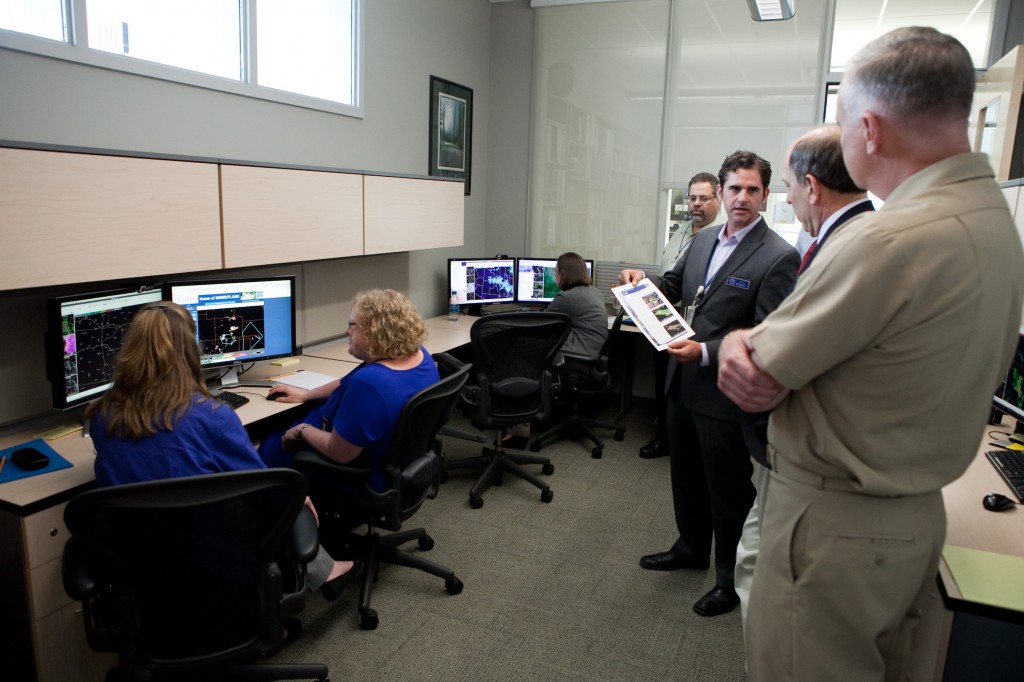
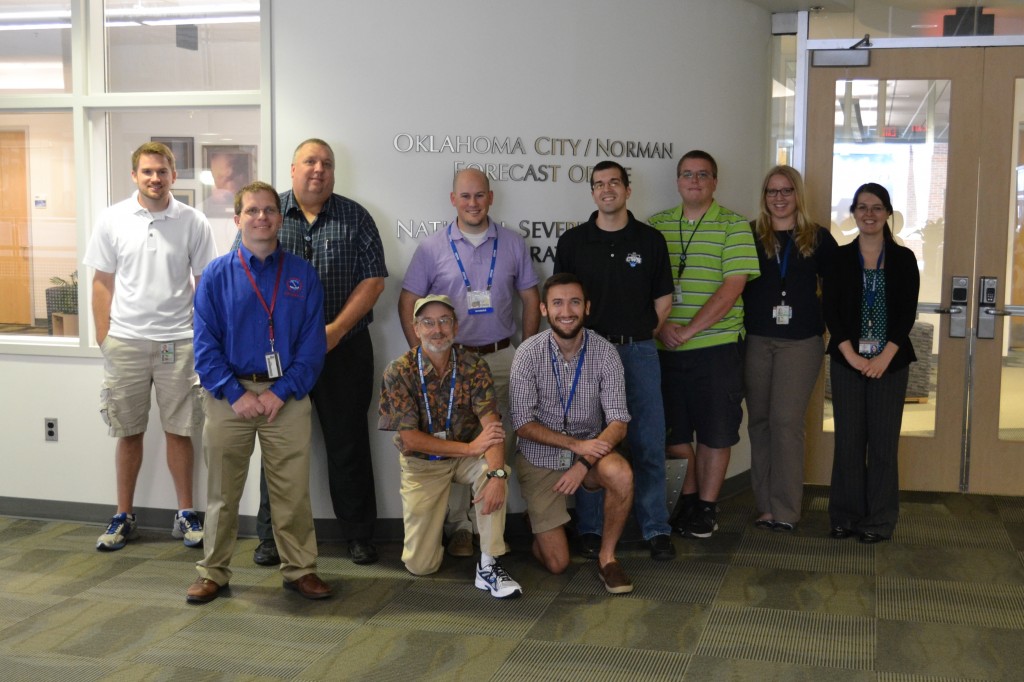
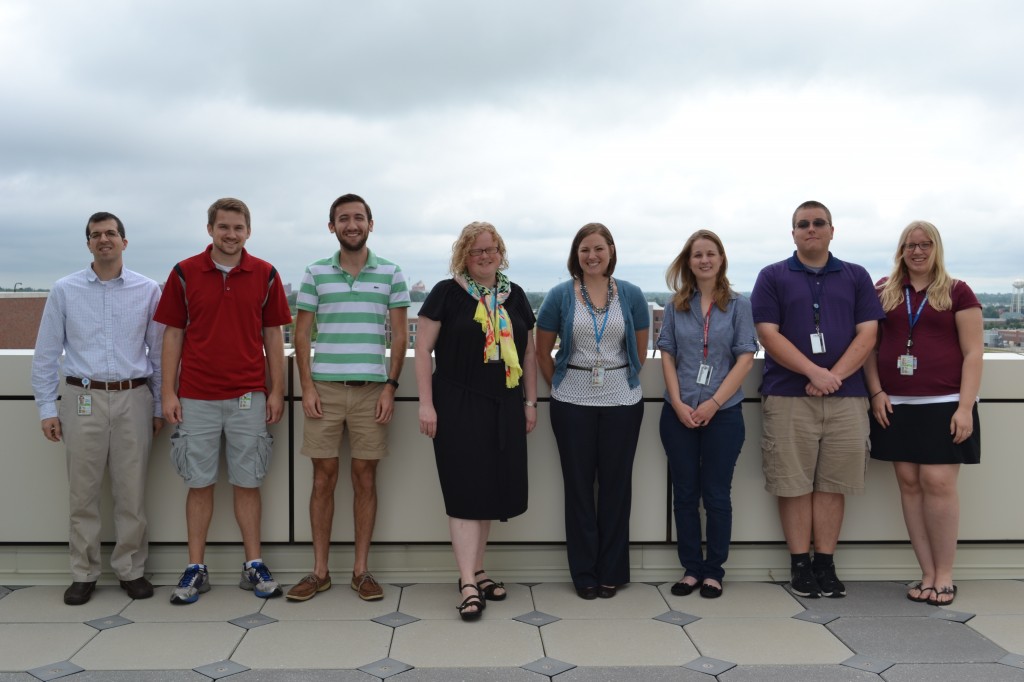
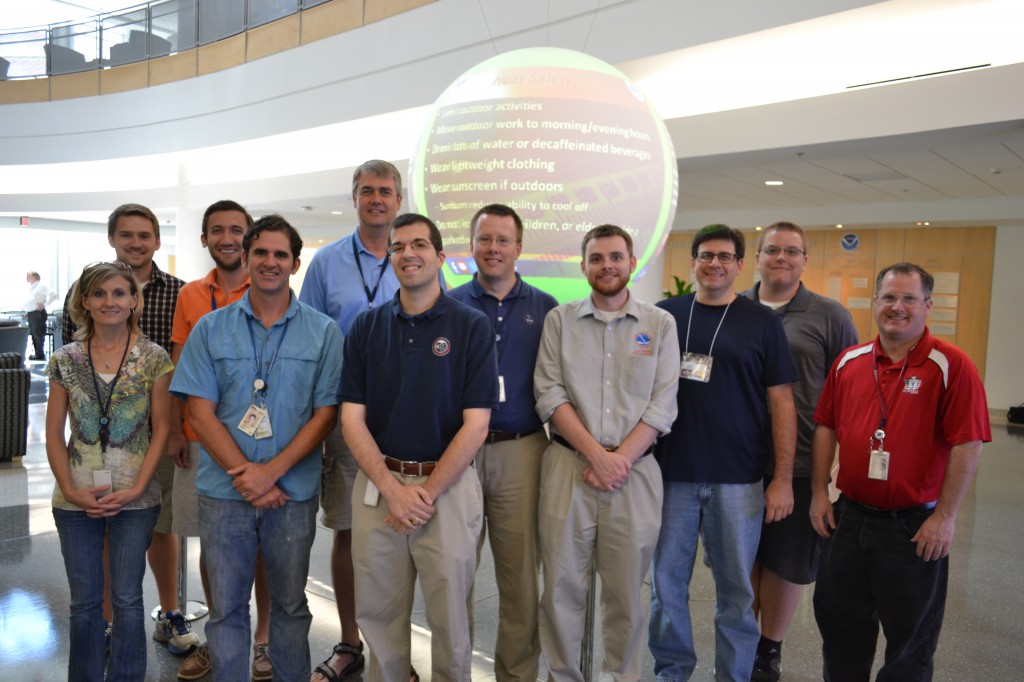
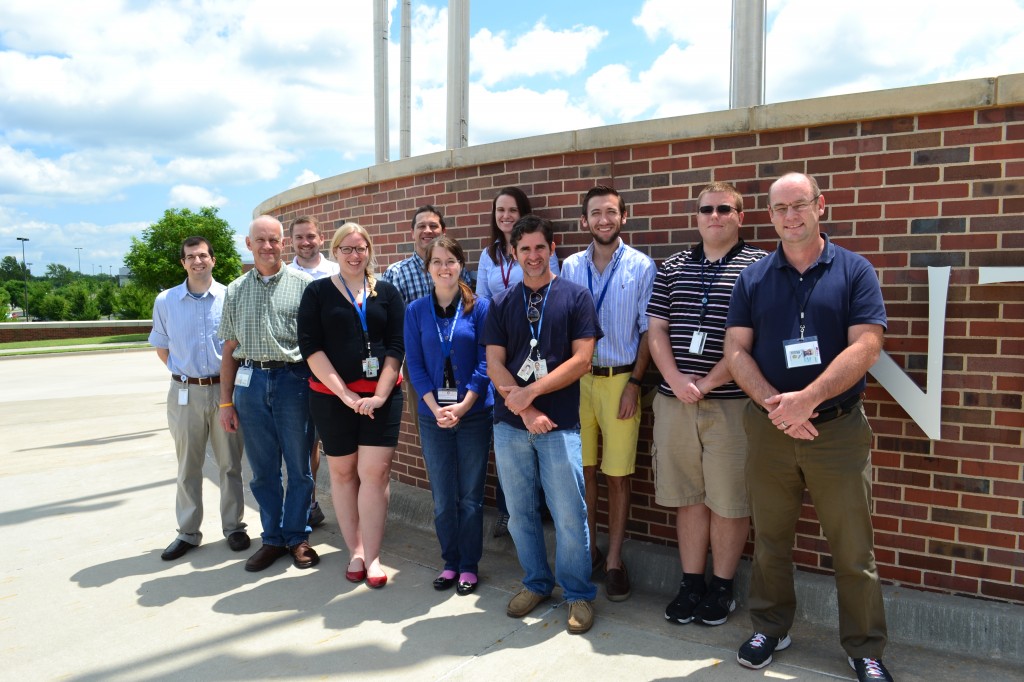





















 A team from NSSL and HyDROS will partner with the NOAA Hydrometeorological Testbed at the Weather Prediction Center to host the FFaIR will explore using high-resolution atmospheric and hydrologic models to improve short-term forecasts of both precipitation amounts and flash flooding. The project runs from July 8-26, 2013.
A team from NSSL and HyDROS will partner with the NOAA Hydrometeorological Testbed at the Weather Prediction Center to host the FFaIR will explore using high-resolution atmospheric and hydrologic models to improve short-term forecasts of both precipitation amounts and flash flooding. The project runs from July 8-26, 2013.




 Congrats to JJ! He was awarded the American Meteorological Society Journal of Hydrometeorology Editor’s Award at the annual conference in Austin, TX. The citation notes his service to the Journal and for his “insightful, timely, and thorough reviews.”
Congrats to JJ! He was awarded the American Meteorological Society Journal of Hydrometeorology Editor’s Award at the annual conference in Austin, TX. The citation notes his service to the Journal and for his “insightful, timely, and thorough reviews.” HyDROS scientists Dr. Pierre Kirstetter and Dr. Jonathan Gourley (NOAA/NSSL) have been invited toparticipate in the Hydrological Cycle in the Mediterranean Experiment (HyMeX), the largest weather field research project in European history. HyMeX is a 10-year international effort to better understand, quantify and model the hydrologic cycle in support of improved forecasts and warnings of flash floods in the Mediterranean region. Improved understanding of the land,atmosphere and ocean interactions that contribute to flash flooding in this part of the world will advance the state of the science that will ultimately be represented in forecast models with application in the United States.
HyDROS scientists Dr. Pierre Kirstetter and Dr. Jonathan Gourley (NOAA/NSSL) have been invited toparticipate in the Hydrological Cycle in the Mediterranean Experiment (HyMeX), the largest weather field research project in European history. HyMeX is a 10-year international effort to better understand, quantify and model the hydrologic cycle in support of improved forecasts and warnings of flash floods in the Mediterranean region. Improved understanding of the land,atmosphere and ocean interactions that contribute to flash flooding in this part of the world will advance the state of the science that will ultimately be represented in forecast models with application in the United States. HyDROS’s new book,
HyDROS’s new book,  HyDROS group has been transferring their high-resolution Coupled Routing and Excess STorage (CREST) hydrological model and the rainfall-triggered Landslide model to NASA’s SERVIR-Africa Mission and NOAA’s Flash Flood Headquarter Office for a Continental US-wide National-Flood-Landslide (NFL) project.
HyDROS group has been transferring their high-resolution Coupled Routing and Excess STorage (CREST) hydrological model and the rainfall-triggered Landslide model to NASA’s SERVIR-Africa Mission and NOAA’s Flash Flood Headquarter Office for a Continental US-wide National-Flood-Landslide (NFL) project.




 HyDROS Lab presented 6 Oral Talks and 10 Posters, covering 4 general areas, at the International Symposium on Earth-science Challenges (ISEC), hosted the University of Oklahoma at Norman.
HyDROS Lab presented 6 Oral Talks and 10 Posters, covering 4 general areas, at the International Symposium on Earth-science Challenges (ISEC), hosted the University of Oklahoma at Norman. Gina Hodges, OU graduate and Atmospheric Radar Research Center student, will receive $30,000 a year for the next three years to investigate her proposed research topic, Prototyping a Flash Flood Prediction System Using Next Generation Radar Observations and Stormscale Rainfall Forecasts.“Itis my goal to improve the current methods used for flash flood prediction to protect lives and property of the public,” said Hodges. “In order to accomplish this goal, I will use an interdisciplinary approach combining my background in meteorology, hydrology and social sciences.” This interdisciplinary method will be applied to recent flash floods that occurred during the spring of 2010 – specifically, the Nashville, Tenn., flood that inundated the Grand Ole Opry House, the deadly Arkansas campground event and the urban Oklahoma City event.The three events chosen were recent with significant impacts and can be studied to prevent such costly and deadly results in thefuture, according to Hodges.
Gina Hodges, OU graduate and Atmospheric Radar Research Center student, will receive $30,000 a year for the next three years to investigate her proposed research topic, Prototyping a Flash Flood Prediction System Using Next Generation Radar Observations and Stormscale Rainfall Forecasts.“Itis my goal to improve the current methods used for flash flood prediction to protect lives and property of the public,” said Hodges. “In order to accomplish this goal, I will use an interdisciplinary approach combining my background in meteorology, hydrology and social sciences.” This interdisciplinary method will be applied to recent flash floods that occurred during the spring of 2010 – specifically, the Nashville, Tenn., flood that inundated the Grand Ole Opry House, the deadly Arkansas campground event and the urban Oklahoma City event.The three events chosen were recent with significant impacts and can be studied to prevent such costly and deadly results in thefuture, according to Hodges.
 CREST (Coupled Routing and Excess STorage), a high-resolution distributed Hydrological Model developed through a collaborative effort among OU, the ARRC and CEES, was adopted by the NASA Marshall Space Flight Center for their SERVIR-Africa and SERVIR-Mesoamerica system deployment. SERVIR, a joint NASA-USAID initiative, is a Regional Visualization and Monitoring System that currently provides critical and actionable information for Central America,the Dominican Republic and East Africa, and addresses the nine societal benefit areas of the Group on Earth Observations (GEO): disasters, ecosystems, biodiversity, weather, water, climate, health, agriculture, and energy.
CREST (Coupled Routing and Excess STorage), a high-resolution distributed Hydrological Model developed through a collaborative effort among OU, the ARRC and CEES, was adopted by the NASA Marshall Space Flight Center for their SERVIR-Africa and SERVIR-Mesoamerica system deployment. SERVIR, a joint NASA-USAID initiative, is a Regional Visualization and Monitoring System that currently provides critical and actionable information for Central America,the Dominican Republic and East Africa, and addresses the nine societal benefit areas of the Group on Earth Observations (GEO): disasters, ecosystems, biodiversity, weather, water, climate, health, agriculture, and energy. UNIVERSITY OF OKLAHOMA
UNIVERSITY OF OKLAHOMA
















